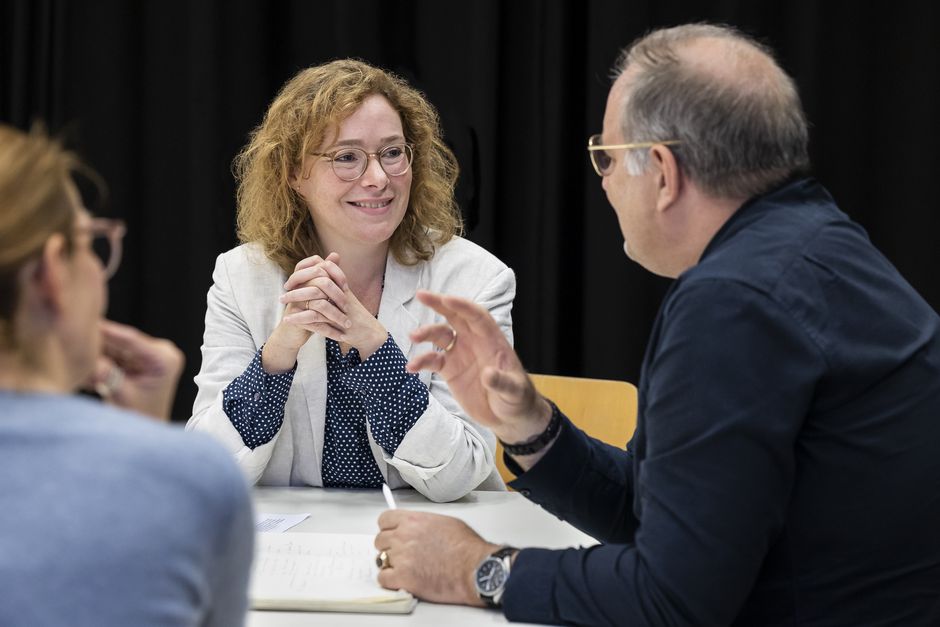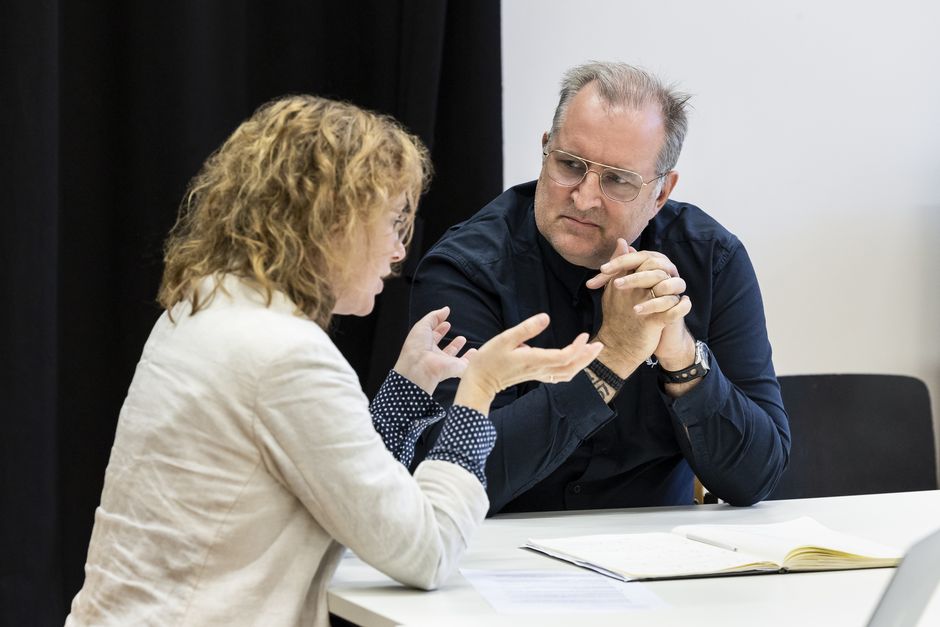“We need a clear commitment at the political level.”
Anna Luise Kiss and Norbert Palz about the HZT and it's future
The HZT is a place that deals with topics that concern us as a society. It was completely natural to engage with subjects such as migration, decolonialisation and diversity at the HZT already very early on, all of which have influenced the city. Why is that so?
Anna Luise Kiss: There are many reasons for that. A central factor is the constellation itself – cooperation with the large University of the Arts and the Ernst Busch University of the Performing Arts – by the way, respectively a former West and a former East institution – with TanzRaumBerlin in a merger of the independent scene in Berlin. It is also the international network in which the HZT has played a role from the very beginning. Through this, discourses that were already being discussed in other countries before us could be brought into the HZT at a very early stage. And then via the HZT into our own universities. That is also true for the important topic of inclusion. The HZT is a place that works at a seismographic scale for us all.
Norbert Palz: What we have here are processes in which political topics are dealt with and translated into an artistic form – not in the sense of a one-to-one translation, but yet so precisely that they make their point. It’s about critically reflecting on the challenges facing society and then developing an independent artistic something from this criticism. This will be formative in the coming years for artistic praxis – to also make this translation process new and artistically interesting.
What is it that makes the HZT model so special in the cosmos of Berlin’s higher education landscape?
Anna Luise Kiss: In a way, the HZT is a blueprint for what Berlin needs as an artistic or even entrepreneurial ecosystem. It shows very well what is possible when institutions work together – a growth in quality.
Norbert Palz: I can’t emphasise often enough that this type of institutional network, which is either already being lived here in Berlin or is on its way, is a very unique feature – also as a possible response to the big issues we are currently confronted with. The communication of scientific findings and their transformation via an artistic praxis into a purely artistic performance or a communicative interaction with civil society is also one way we will be able to cope with these great challenges. Because it breaks with a linearity in the methodology or thinking processes.
Anna Luise Kiss: It’s also about sustainability. If Berlin wants to retain its pioneer position and claim to be a capital city of culture, then we must do more to examine the question of sustainability. We’ve already been doing that in the arts and in the area of artistic research for quite a while now by generating knowledge and models in this subject area that people can tangibly experience. But we are also doing it in a very practical way, for example, by pooling resources for the HZT and distributing these. It’s about sharing resources, about togetherness, the question of how we can think new spaces with one another and bring them together to achieve joint results.
But that is also subject to organisational and financial limitations.
Norbert Palz: The HZT has completed its pilot phase and we are already at a point where a consolidation must take place, because the HZT is an operation that is carried by a tremendous idealism. And this idealism, the courage, the optimism and unfortunately the self-exploitation that goes hand in hand with that sooner or later reach their limits. If you look at the HZT Report, you can see there is an extreme crossing of boundaries, the costs of which are borne by those actively involved, and this is simply no longer tenable. We need a clear commitment at the political level that also takes into consideration economic aspects. It’s about the staffing situation – and the conditions for professors there must reach a level that is comparable with other German and international universities. That is currently not the case, and Berlin is lagging behind the 25 percent below the norm in this area. The same applies for the situation of the administrative staff, not least with respect to the potential for procuring third-party funds, for example, applying for international research projects.
Anna Luise Kiss: This intrinsic motivation is symptomatic for the arts. Paying out in advance, as it were, with a great deal of idealism and people going far beyond their own limits. Unfortunately, the fact is that the political realm also profits from projects with an international reach without having provided the corresponding financial support and human resources for this. In the long run that’s unacceptable, never mind sustainable – also not for the city. Incidentally, the HZT is a one of the most stringently organised institutions that I know of. It is exemplary in the way it integrates the different types of expertise – that of the students, the employees, the administration colleagues – in organising the discourse, documenting it and defining milestones. I find that remarkable, especially when we are talking about new forms of managing the arts universities. Management models are productively adopted by artistic personalities in order to continue to exist in this increasingly faster-paced rhythm and cope with the demands we are confronted with.
Norbert Palz: It is also interesting in the context of a greater discourse that is evolving around the question of less hierarchical structures. The HZT does not work as a satellite with its own laws but is subject to the basic order of things and Berlin’s university laws. But in a very participatory way.
What does the HZT need to stabilise itself? What are the next steps?
Anna Luise Kiss: Among other things, what we are already doing – that is, the two supporting universities closing their ranks. We will try within the context of the university contract negotiations, alongside many other topics that affect us as universities, to make clear the difficult situation the HZT finds itself in. And, from our perspective, the requirements that have to be fulfilled to generate stability are pretty moderate.
Norbert Palz: If the university negotiations end in a way that stabilisation cannot be achieved, then that would harm the HZT’s profile, which in turn would lead to the programme being slimmed down and minimalised. And it really would be fatal. Not only cut out of the HZT system, but out of the city system.
Norbert Palz: If the university negotiations end in a way that stabilisation cannot be achieved, then that would harm the HZT’s profile, which in turn would lead to the programme being slimmed down and minimalised. That really would be fatal for Berlin as a location – the HZT is very involved in the city, whether in social projects, school projects, or by engaging with the public space. The implications of this would be felt immediately, because there are not that many comparable institutions, also not in the European region.
Dr. Anna Luise Kiss has been Rector of the Ernst Busch University of the Performing Arts since October 2021, Prof. Dr. Norbert Palz has been President of the Berlin University of the Arts since April 2020. Both institutions are responsible for the HZT.
The interview was conducted by Claudia Assmann, Press Speaker for the Berlin University of the Arts.

